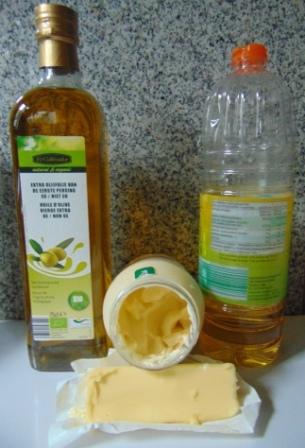Fats provide a lot of energy.
Fatty acid having a maximum number of hydrogen atoms (H) is a saturated fatty acid.
If there are hydrogen atoms missing and are replaced by a double bond, one speaks of an unsaturated fatty acid.
If there is only one double bond, then it is a single or mono- unsaturated fatty acid.
Poly- unsaturated fatty acids contain more than one double bonds.
 Roughly speaking: saturated fats are solidified at room temperature (congealed) and mainly of animal origin. Large amounts of saturated fats increase the risk of heart disease, cancers and strokes.
Roughly speaking: saturated fats are solidified at room temperature (congealed) and mainly of animal origin. Large amounts of saturated fats increase the risk of heart disease, cancers and strokes.
Vegetable fats are usually unsaturated, and liquid at room temperature, except palm oil and coconut oil, which contain a high proportion of saturated fatty acids.
Unsaturated fatty acids are important because they provide two essential fatty acids: linoleic acid (an omega -6 fatty acid) and alpha - linolenic acid (an omega - 3 fatty acid that is not produced by the body itself).
Alpha- linolenic acid is found in oily fish, flaxseed and dark green leafy vegetables (purslane, mint, watercress, spinach) in pumpkin and hemp seeds, (wal) nuts and shellfish.
Linoleic acids are found in sunflower oil, sesame seed, pumpkin, nuts, grains, saffron, vegetables and most vegetable oils.
Trans fats are unsaturated fats that are converted in industrial processes into hardened fats. They are used to improve the taste, texture and shelf life of processed foods in cakes, potato products, savory snacks, ready-made meals, margarine, frozen pizzas, industrial cookies and pastries ... and are even more harmful than saturated fats. The packaging describes them as "hardened fat" or "hydrogenated oil". There are regularly proposals to ban artificial trans fatty acids.
Daniel Lieberman once said: "Trans fats are essentially a form of slow-acting poison." Only in 2015 did the US Food and Drug Administration give them the stamp "unsafe food."
Saturated fats are worse than unsaturated. Single - and polyunsaturated fats help to keep cholesterol levels low. This fatty substance (cholesterol) can affect the arteries. There are many types and classes of cholesterol. Their task force and effect is far from fully understood. Some species would increase the risk of heart disease, others would just have a good influence.
‘I would rather die of cholesterol than of hunger.’(Frederic Dard)
I’ve been on a diet for two weeks and all I’ve lost is two weeks. (Totie Fields)
